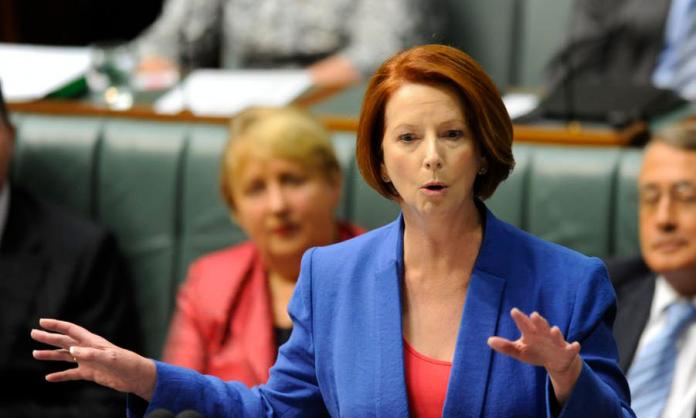On the afternoon of 9 October 2012, then prime minister Julia Gillard famously declared in parliament, “I will not be lectured about sexism and misogyny by this man, I will not. Not now, not ever”.
As “this man” was opposition leader and soon-to-be Prime Minister Tony Abbott, well known for his misogyny and an avatar for every misogynist most women had ever encountered, it’s no wonder the speech went viral.
At the tenth anniversary, recollections have been glowing. Labor Minister for the Environment Tanya Plibersek said, “I felt I was there while history was being made”. Zoe Daniels, a former ABC journalist and now a teal independent MP, summed up a lot of the speech’s appeal with, “There was a collective female head nod around the world”.
But these celebrations obscure a lot else that went on in parliament that day. Gillard is no doubt glad that her speech “has become divorced from [its] parliamentary context”, as she put it this week.
Gillard’s government rested on such a narrow and tenuous majority, and was reliant on ex-LNP MP Peter Slipper taking the speaker’s chair so that the outgoing Labor speaker could sit on the backbench and vote. When it was revealed that Slipper had sent numerous misogynist texts to a male staffer whom he was also alleged to have sexually harassed, Abbott took the opportunity to have Slipper removed as speaker. Not, of course, in order to make a stand against sexism, but in an effort to destabilise the Gillard government. And so it came to pass that, when Gillard rose to speak, it was to defend keeping Slipper as the speaker of parliament—a sordid attempt to hold on to power, whatever the message it might send.
But this wasn’t the only aspect of the context that undermined Gillard’s anti-sexist credentials. There was also something much more central to the Gillard government’s service to Australian capitalism: neoliberal cuts to welfare, including those targeting women.
On the very day of the celebrated speech, the Gillard government passed a bill largely unnoticed by political commentators, the Social Security Legislation Amendment (Fair Incentives to Work) Act 2012. This legislation forced parenting payment recipients (who are mostly women) off their payment once their youngest child turned 6, in the case of partnered parents, or 8, in the case of single parents. Previously, parents had remained eligible for the payment until their youngest child turned 16, so this represented a major attack. Those forced off their payment would be moved onto Newstart, a much lower allowance. This affected roughly 163,000 single parents, and saved the government $728 million over the following four years.
Very little reference has been made to this in the week’s celebrations of Gillard’s speech. It has largely been swept under the carpet, as it was by Gillard at the time. Speaking on ABC Radio Adelaide on 11 October, she merely noted, “There are still barriers there—I mean, it’s not easy from the perspective of work and family life”.
Gillard in fact celebrated these attacks during her time in office. On the first anniversary of the bill’s passing, Gillard defended the changes that left single mothers, some of the poorest women in Australia, between $60 and $100 a week worse off. In the classic neoliberal-speak of the legislation’s title, “Fair Incentives to Work”, she spoke of helping women return to paid work.
One of the very few articles in the last week to mention this crime against working class and poor women was one by Margaret Ambrose in the Guardian on 5 October titled “Julia Gillard’s misogyny speech has empowered me—to speak up about her government’s shortcomings”. Mocking the articles praising Gillard, Ambrose writes, “I too remember exactly where I was when Gillard delivered her slap-down of the patriarchy. I was a sole-care single mother of two pre-schoolers, who had just discovered that in addition to having the full-time job of caring for small children, I was soon going to have to find a second one”.
Another who remembers where she was on that day is Terese Edwards, head of the National Council for Single Mothers and their Children. As Gillard delivered her misogyny speech, Edwards led a protest on the lawns of parliament against the welfare bill then passing through the Senate.
The 2018 Poverty in Australia report noted a sharp rise in poverty among households with sole parents who were without paid work over the two years following the speech, from 35 percent in 2013 to 59 percent in 2015. Currently, 37 percent of single-mother families are living in poverty. As far as Australia’s bosses are concerned, this represents mission accomplished, and roll on the stage 3 tax cuts for the rich.
If you want to reminisce about the Labor government led by Australia’s only woman prime minister, remember this attack on women. It reveals the real nature of Gillard’s government (and Albanese’s today), far more than a few well-chosen barbs directed at Tony Abbott.









